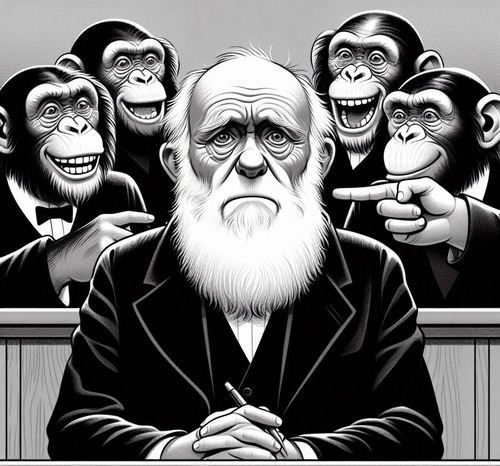Creation or Evolution: Let the Evidence Speak for Itself
Evaluate evidence—8 compelling reasons—to see how Biblical creation accounts for life’s origins better than evolution does…
Debate on the question of life’s origins continues to rage. How did the staggering complexity of living systems arise? Both of the two predominant explanations—the theories of evolution and creation—make substantive claims. However, we shall let the ultimate arbiter be the evidence itself. Objectively analysing the empirical data and logical reasoning behind the key claims for each side should help us gain clarity on which model the evidence favours as the best explanation for life’s origins.
Evolution Claim #1: Life Comes from Nonlife
Abiogenesis—the assertion that life spontaneously arose from non-living matter—is a cornerstone of evolutionary theory. However, there is not a single piece of empirical evidence to support this claim. Despite extensive research and experimentation, scientists have yet to demonstrate how nonlife could naturally give rise to even the simplest forms of life. The complexities of cellular structures, genetic information, and biochemical processes far exceed what random chance and natural processes can explain.
Evolution Claim #2: Complex Life Evolved from Unicellular Organisms
Evolutionary theory posits that complex life, including human beings, evolved from unicellular organisms. Yet, the fossil record does not provide evidence for the multitude of intermediate forms that such a process would require. We observe unicellular organisms and fully formed multicellular organisms, but no gradual sequence of dual-cell, triple-cell, or other intermediate forms. This discontinuity poses a significant challenge to evolutionary explanations.
Evolution Claim #3: Time and Chance Drive Evolution
Evolution relies on vast amounts of time and random chance to explain the diversity of life. However, time actually works against the probability of successful evolutionary outcomes. The odds of even a single functional protein forming by chance are astronomically low—estimated at 10^140. This improbability suggests time and chance are inadequate mechanisms for driving the complexity we see in biological systems.
Evolution Claim #4: Microevolution is Evidence for Macroevolution
Evolutionists often cite microevolution—small changes within species—as evidence for macroevolution, the emergence of entirely new species. However, microevolution only involves the reshuffling of existing genes, not the creation of new genetic information. Mendelian genetics confirms while traits can vary, there is no mechanism for the generation of new, complex genes necessary for macroevolution.
Evolution Claim #5: Similarities among Organisms Point to a Common Ancestor
Evolutionists claim similarities, such as shared anatomical structures, among living organisms, point to a common universal ancestor. However, these “homologous” similarities point equally, if not more compellingly to a shared Creator, do they not? The bones in the vertebrate limbs of amphibians, reptiles and mammals, for instance, point to a common structural blueprint seamlessly implemented across diverse organisms by an intelligent Maker, rather than to being the result of Darwinian processes.
Evolution Claim #6: Natural Selection is Evidence for Evolution
Or is it, really? Natural selection—the process of removing less ‘fit’ traits in a species over time—can be observed in nature. However, it does not prove that new kinds of organisms can evolve. Far from it. Natural selection only helps keep a species healthy by getting rid of harmful traits. It does not create the new genetic information needed for one kind of organism to evolve into a completely different kind.
Evolution Claim #7: Genetic Mutations may Drive Large-scale Evolutionary Change
Mutations and genetic variation are often seen as the basic building blocks for evolution, leading to new species and body plans over time. However, most mutations that have been observed are either neutral (having no effect) or harmful, damaging the genetic information instead of improving it. While small changes, such as differing beak shapes in Galapagos finches, can happen due to genetic mixing, entirely new genes needed for big evolutionary changes have never been seen to appear on their own.
Evolution Claim #8: Speciation is Evidence for Evolution
If speciation, or appearance of new species did occur, it would support evolution’s ability to create new life forms. However, the examples of speciation cited by evolutionists usually involve one species splitting into two groups that can no longer mate with each other—for reasons such as living in different places or having different behaviours. No new genetic information or major physical changes have been seen in this process.
Evidence for Biblical Creation Over Evolution
Creation Claim #1: Where There is a Design, There Must Be a Designer
The intricate design of life points unmistakably to an intelligent Creator. The codes within DNA, which function as highly sophisticated instructions for building and maintaining living orgaevidencenisms, are a clear example of such design. Codes and information systems require an intelligent source; they do not and cannot arise by accident. This principle aligns with the biblical assertion that God created life, imbuing it with purpose and complexity.
Creation Claim #2: The Earth and Universe Are Both Young
Contrary to the evolutionary timeline, which spans billions of years, creationists assert the Earth and universe are relatively young, measured in thousands of years. Several lines of evidence support this view. For instance, the presence of solar nebulae, which should dissipate within thousands of years, suggests a young cosmos. Additionally, the rate of alpha decay, a type of radioactive decay where an atomic nucleus emits an alpha particle, aligns with a young Earth. If the Earth were billions of years old, we would expect different distributions and concentrations of decay products than what we actually observe. This evidence supports the biblical timeline of creation.
Creation Claim #3: Life Forms Are Stable with Minor Variations
The life forms we observe today are essentially the same as when they were created, exhibiting only minor variations within kinds. Breeding experiments, such as those conducted by Mendel, show that while genes can be shuffled, new genetic information does not spontaneously arise. Cats remain cats, and dogs remain dogs, with no evidence of one kind transforming into another. This stability supports the creationist model of life.
Creation Claim #4: Evidence of a Global Flood Backs Bible Accounts
The Bible describes a worldwide flood around 2500 BC, which left significant geological evidence. Limestone and sedimentary layers, which precipitate out of water, are found globally, supporting the occurrence of such an event. Additionally, marine fossils discovered in mountainous regions, including the Himalayas, indicate that these mountains were once submerged, corroborating the biblical account of a global flood.
Creation Claim #5: The Sudden Appearance of Life Supports Creation
The fossil record shows complex life forms suddenly appeared, fully formed, with no clear ancestors. This event, often referred to as the “Cambrian Explosion,” aligns with the biblical idea that God created distinct life “kinds” without a gradual development from simple life forms. This supports the view that life was created by God in a relatively short time frame, rather than evolving over millions of years.
Creation Claim #6: Complex Design Can’t Be by Chance
Biological life shows incredible levels of complex, purposeful design that can’t be explained by natural processes alone. Examples include molecular machines, metabolic pathways, and the detailed information in DNA. This complexity suggests the work of an intelligent designer.
Creation Claim #7: Earth is Perfectly Tuned for Life
Many physical constants in science are finely tuned to make life possible, from the forces in physics to the properties of carbon. These precise conditions are extremely unlikely to happen by chance and support the biblical view that Earth was specially created for human life.
Creation Claim #8: Consciousness Can’t Come from Matter Alone
Human consciousness, including our ability to think, create, and feel, can’t be fully explained by physical processes. The existence of the mind, which is different from the body, supports the idea we are uniquely created in God’s image. Materialism alone can’t explain non-material realities such as consciousness.
Evaluating the Evidence for Biblical Creation Over Evolution
When we examine the evidence objectively, the claims of evolution fail to provide a comprehensive explanation for the origin and complexity of life. From the inability of abiogenesis to produce life from non-life, to the lack of transitional forms in the fossil record, to the improbability of random processes generating functional proteins, the theory of evolution faces significant challenges.
In contrast, the creation model offers compelling explanations: the intricate design of life points to an intelligent Creator, the young age of the Earth aligns with observable data, the stability of life forms supports the idea of distinct “kinds,” and geological evidence backs the biblical account of a global flood. Furthermore, the sudden appearance of complex life, the specified complexity found in biological systems, the fine-tuning of Earth for life, and the non-material nature of consciousness all reinforce the creationist perspective. Thus, when we let the evidence speak for itself, the creation model emerges as a more plausible and coherent explanation for the origins of life.
Related Reads:
Editor's Pick

Christian Obedience: God’s Empowerment or an Act of Our Will?
Every Christian knows the struggle. You’re fighting a besetting sin—again. You’ve resolved to do better—again. And you’re wondering: Should I [...]

The Throne-Room Vision: Who Did Isaiah See?
The scene is unforgettable: Isaiah stands in the temple, and suddenly the veil between heaven and earth tears open. He [...]

The Angel of the Lord: Can We Be Certain It Was Christ All Along?
Throughout the Old Testament, a mysterious figure appears: the Angel of the LORD. He speaks as God, bears God’s name, [...]
SUPPORT US:
Feel the Holy Spirit's gentle nudge to partner with us?
Donate Online:
Account Name: TRUTHS TO DIE FOR FOUNDATION
Account Number: 10243565459
Bank IFSC: IDFB0043391
Bank Name: IDFC FIRST BANK






